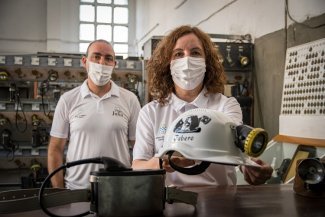Tara Peel (left) is a political advisor at the Canadian Labour Congress; John Mark Mwanika (right) is programmes officer at the Amalgamated Transport and General Workers’ Union (ATGWU-Uganda).
For Tara Peel, a political advisor at the Canadian Labour Congress, just transition is the solution to ensuring that emissions are reduced dramatically in the fight to curb global warming to 1.5 degrees. She believes the framework is key to making sure that every step needed is taken as quickly as possible across every workplace and in every sector. John Mark Mwanika is programmes officer at Uganda’s Amalgamated Transport and General Workers’ Union (ATGWU-Uganda). According to Mwanika, it’s high time for the debates around jobs and the planet to become one – because workers and trade unions can fight for jobs and for the planet at the same time. Equal Times discussed the impacts of the climate crisis on workers in Uganda and Canada, as well as the challenges ahead with both trade unionists. You can scroll down to watch the videos.
Mr. Mwanika, how did you make transport workers in Uganda care about climate change?
John Mark Mwanika: Understanding and linking whatever climate change is – I mean, the environment and weather patterns, to climate change – is a bit difficult to put to our members; for them to actually be part of the actions. But [awareness has been building] over time, because of the rain, the harsh rainy seasons we sometimes have – and this happens at peak times, either in the morning, evenings or afternoon, when they’re actually supposed to rush out to make a quick buck, and that’s when it is pouring. And Kampala is a hilly place. A 30-minute downpour, and all the roads are flooded. So, there is no work and if there is no work, it means there’s no money because they work on what we call hand-to-mouth. Now, because these are becoming rampant, they are beginning now to question: “What is this?” They tell you: “We used not to have this; what is the problem?” Then they are giving us an opportunity to show them the link between what is happening and what we talk about as climate change.
What actions did you take to prepare these workers for the effects of climate change?
J.M.M.: One of the things we’re doing, first of all, is to create awareness; that this is a serious thing and each and every worker, especially transport workers, can take whatever small action to combat climate change. We’re looking at, first of all, issues of just maintaining their vehicles, maintaining their motorcycles. You know, they are talking about the bottom line, the profit that they take home. But because they are not servicing them, the vehicles become older and become weaker and therefore will consume more fuel. The other thing that is coming up is that we’re now introducing them to electric bikes. We are putting them into groups, into savings groups, because they bought the electric motorbikes on loan and we are teaming up with the local bank to finance them to get the motorcycles. So that somehow, with that, we will have a good uptake. Then maybe we’re looking at, for example, in two years’ time, we can have about 50 per cent of our motorcycle riders riding electric bikes – meaning that we shall be cutting down on emissions. But more importantly, they’ll be having decent work because the motorcycles will be running on a lower cost and they’ll be benefiting more.
Mrs. Peel, how has climate change affected Canada, its workers and its communities?
Tara Peel: 2021 was a really hard year for climate events, extreme climate events. We had an extreme drought across the prairies, which impacted farmers tremendously, followed by several hundred wildfires across the western provinces in particular, but also in northern Ontario, which put many, many emergency responders in harm’s way. There’s an extreme heatwave that lasted for days and days and weeks and weeks, killing almost 600 people. You know, you wouldn’t think that in Canada 600 people would lose their lives to a heatwave, but many of those people were vulnerable, low-income, isolated without many of the social supports that they need to be able to access help, no access to air conditioning. And many people passed alone in their homes. So, yes, extreme weather events related to climate change have had a real impact on workers, families and communities. And not just in the last year; we are seeing these events more frequently. They are more severe and they are already impacting workers’ lives and livelihoods.
Mr. Mwanika, can you tell us about the climate change ‘champions’ that you trained?
J.M.M.: That was way back. I think in 2018, we trained about 40. Actually, during the training, we wanted to call them ‘climate change organisers’. They said: “No, no, no, we are ‘climate change organisers’. Champions in the sense that they wanted to get out there with a different badge, with a different mentality, with a different look. And our informal transport workers are organised in small structures starting at the grassroots stages. That’s where they congregate, either to pick up or drop a passenger. And those stages are where the climate champions are. And the key basic things that they are doing are: one, first of all, to raise awareness of this monster called climate change; two, it’s to try and take action on an individual level – not even at a stage level, but individual level.
Mrs. Peel, what actions did Canada’s government take to ensure a just transition?
T.P.: The current government has made a commitment to implementing just transition legislation and is consulting on some of the principles that should be contained within that legislation. Workers need to see action. They need a plan and they need to be at the table, helping to build that plan. And so we are keen to see ambitious just transition legislation that puts workers at the table – building the plan, looking at the whole of the economy in Canada; building the plan sector by sector because we know that it is not going to look the same necessarily and the needs are not the same in different sectors, all of which will need to rapidly decarbonise and right down to the workplace level. So while it’s true that implementation has been a challenge, Canada’s unions are confident that this is certainly a priority for unions and we are going to make sure that it continues; that it is a priority to see legislation implemented. Legislation that meets the needs of workers and communities, and ensures that the benefits of skills training and good jobs that go along with some of this investment can be realised by women and racialised workers and others who have been historically excluded from some of these benefits. And also while respecting Indigenous rights.
What are the government of Uganda’s climate policies, and how is their interaction with trade unions?
J.M.M.: We’ve never had any kind of formal social dialogue on climate change. Since 2018, we’ve been writing to government on the issue of its National Determined Contribution as a way of pushing government to do something. But whenever we write, we never get the response. Well, I’ve never been involved in any of this. However, the government in its role because of pressure from the global partners and because, I mean, that’s what is happening; government is taking ambitious strides. As we talk right now, just this year in January, the government presented the National Climate Change Act. This is a big one for us because at least now we know that the Paris Agreement [and] the Kyoto Protocol have a legal framework in the country. The other one is that last year the government presented what it termed Interim National Determined Contributions as part of the COP26 commitments. And [these interim contributions], we’ve read through them; they look ambitious. So if we can just pick up these two and we then campaign on them, we can test the government’s goodwill on this and see how far government can commit to ensure that these policies actually come to effect.
Mrs. Peel, how is the CLC working with its affiliates to implement just transition policies?
T.P.: The Canadian Labour Congress is Canada’s largest labour organisation, representing over three million workers in every sector of the economy, in every region of the country. Last June, in 2021, we held our national convention, our constitutional convention, and as part of the resolution’s work, there was an ambitious policy paper on climate action agenda for Canada’s labour movement that will guide our work until the next convention. And it included many really robust calls to action on just transition. It included calling for strong investments in social protections to provide that stability of a strong social safety net as we manage this transition. You know, if you look at the coal sector, which is on the leading edge of this transition and is transitioning much more quickly than many other sectors. In Alberta, where most of the coal power workers live and work, the unions there negotiated a series of supports for workers with the previous provincial government to ensure that workers had access to training supports if they needed them; to mobility supports if they needed to travel for new work; to retirement support to make sure that their pensions are whole at the end of their long working career.
What are the challenges of transitioning to a low-carbon economy in Canada?
T.P.: We are a country with a large fossil fuel sector – that is going to create a challenge. There are many, many workers that are tied to this industry and it is pretty regionally concentrated. So while it may represent a more modest number of workers across the country; in some regions of the country, it is a much larger employer. And so there are definitely challenges associated with that. That doesn’t mean that they are insurmountable. We certainly are up for the challenge, but we cannot separate the need to rapidly reduce emissions from the need to recognise fairness, and that workers didn’t create this problem. In fact, much of the work that workers do in high-emitting sectors helped to build the Canadian economy. So, it is a matter not just of fairness, but it is also a pragmatic question. We need for workers to see themselves in this low-carbon economy; to see a future for themselves and their families, their kids, their communities. Because there are lots of opportunities there. We know that ambitious climate action brings with it many, many more jobs than doing nothing. And doing nothing is not an option.
[VIDEO - Tara Peel, political advisor at the Canadian Labour Congress]
[VIDEO - John Mark Mwanika, programmes officer at Uganda’s Amalgamated Transport and General Workers’ Union]













